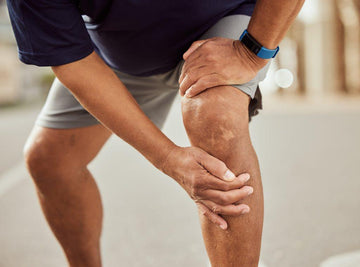Joint pain is a common problem that can affect people of all ages. It usually occurs in the knees, hips, wrists or shoulders and can be caused by a variety of factors, such as overuse, injury, inflammation or age-related wear and tear. But what can you do to relieve or prevent joint pain? In this post, you'll find some proven approaches that can help reduce pain and maintain mobility.
1. Regular exercise
One of the most important measures for relieving joint pain is regular exercise. It may sound contradictory, but exercise is essential to keep the joints flexible and to strengthen the muscles around the joints. Gentle forms of exercise are particularly suitable, such as:
• Swimming : Water relieves pressure on your joints and allows you to move without too much strain.
• Cycling : Gentle cycling strengthens leg muscles and improves blood circulation, leading to better joint health.
• Yoga : Stretching and breathing exercises promote flexibility and reduce muscular tension, which in turn reduces pressure on the joints.
Regular exercise reduces inflammation and prevents joints from stiffening.
2. Weight control
Being overweight puts strain on the joints, especially in the knees, hips and back. Every extra kilo increases the pressure on the joints, which can make pain worse. Maintaining a healthy weight is an effective way to prevent or reduce joint pain. Studies show that even moderate weight loss can help significantly reduce pressure on the joints and reduce pain.
3. Healthy diet
A balanced diet also plays an important role in relieving joint pain. Foods rich in omega-3 fatty acids, such as fatty fish (salmon, mackerel, sardines), flax seeds and walnuts, have anti-inflammatory properties and can help reduce swelling and pain. Antioxidant-rich foods such as berries, spinach and broccoli also support joint health by neutralizing harmful free radicals.
4. Heat and cold therapy
Heat and cold therapy are proven home remedies for pain relief from joint problems:
• Heat therapy : A hot water bottle or a warm bath can help relax muscles and improve circulation. This is particularly effective for stiff joints or muscle tension.
• Cold therapy : In cases of acute inflammation or swelling, the application of cold, such as with an ice pack, is helpful. Cold numbs the affected area, reduces swelling and relieves pain.
5. Dietary supplements
There are some supplements that may be useful in supporting joint health:
• Glucosamine and chondroitin : These two substances are often used to support cartilage health and can help slow joint wear.
• Collagen : Collagen supplements can strengthen the structure of cartilage and improve mobility.
• Turmeric supplements : The curcumin found in turmeric has powerful anti-inflammatory properties and can help relieve joint pain.
Note: Before taking any dietary supplements, you should always consult a doctor to rule out possible interactions or side effects.
6. Physiotherapy
Physiotherapy is an effective way to strengthen joints and maintain mobility. A physiotherapist can recommend individual exercises to strengthen the surrounding muscles and improve movement. Sometimes manual therapy can also help to relieve pain and tension.
8. Correct posture and ergonomics
Many joint pains are caused by poor posture or undue stress on the joints. Be sure to maintain a healthy posture, whether at your desk or when lifting heavy objects. Ergonomic furniture or aids can help reduce pressure on the joints, especially during work or everyday activities.
Conclusion
Joint pain can significantly affect everyday life, but there are many ways to relieve it and address its causes. Regular exercise, a balanced diet and targeted therapeutic measures such as physiotherapy or heat therapy are effective ways to promote joint health. However, if the pain persists or worsens, it is important to see a doctor to determine the cause and find appropriate treatment.





